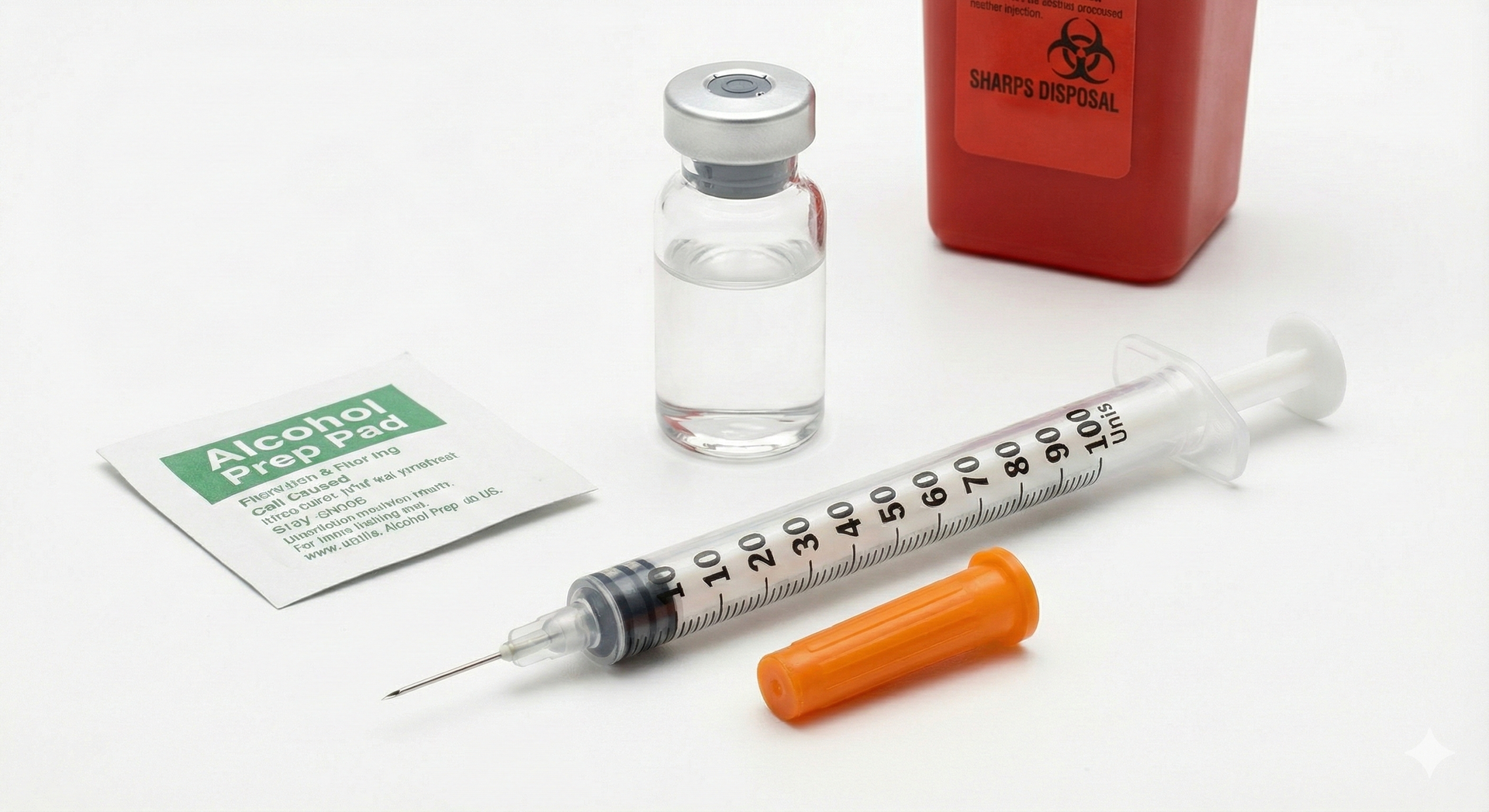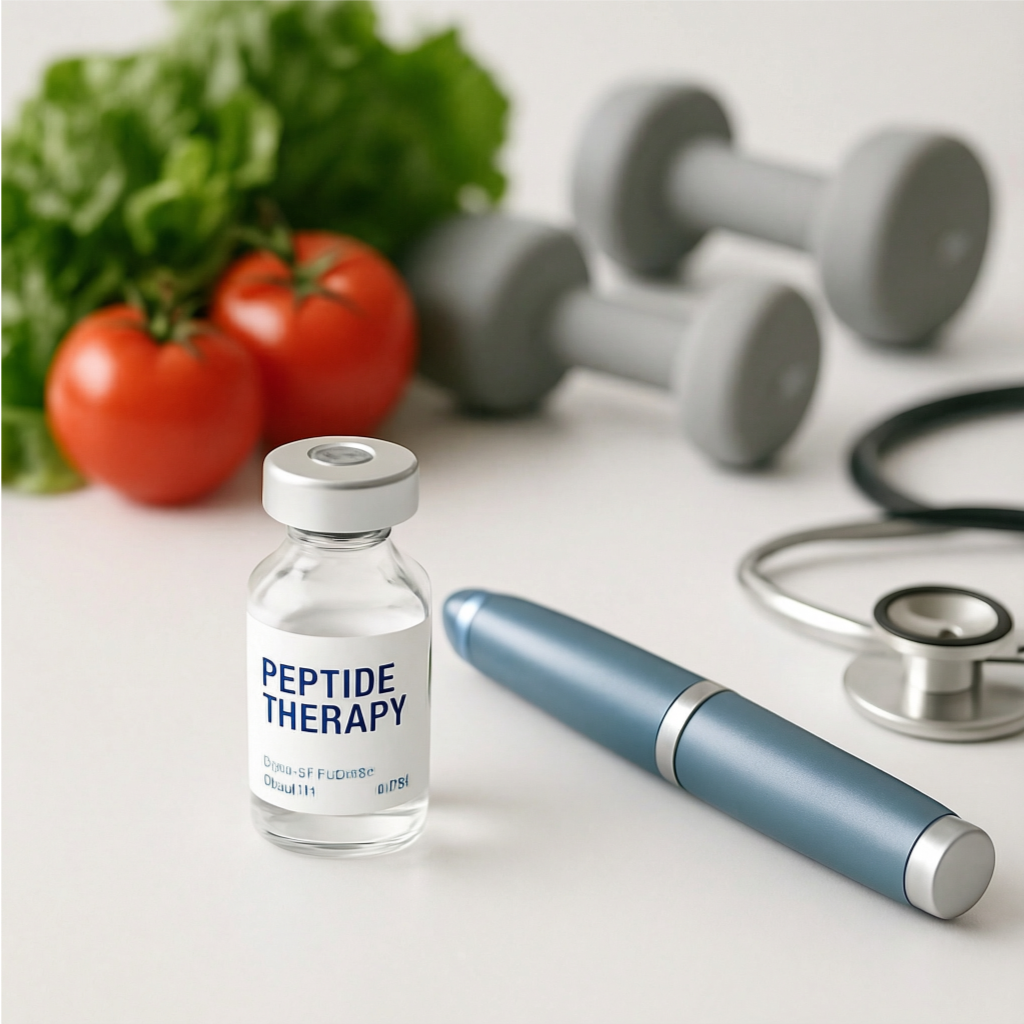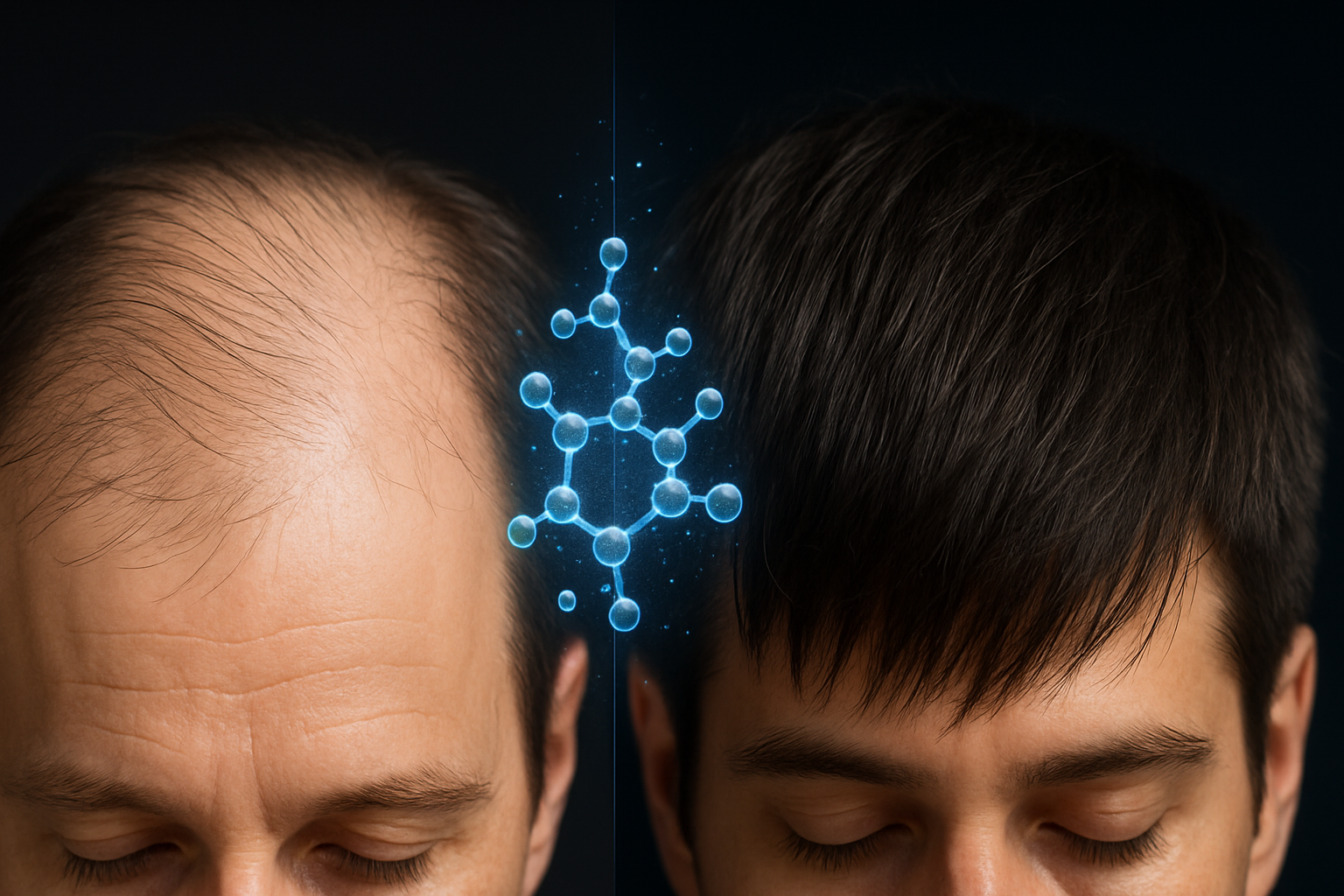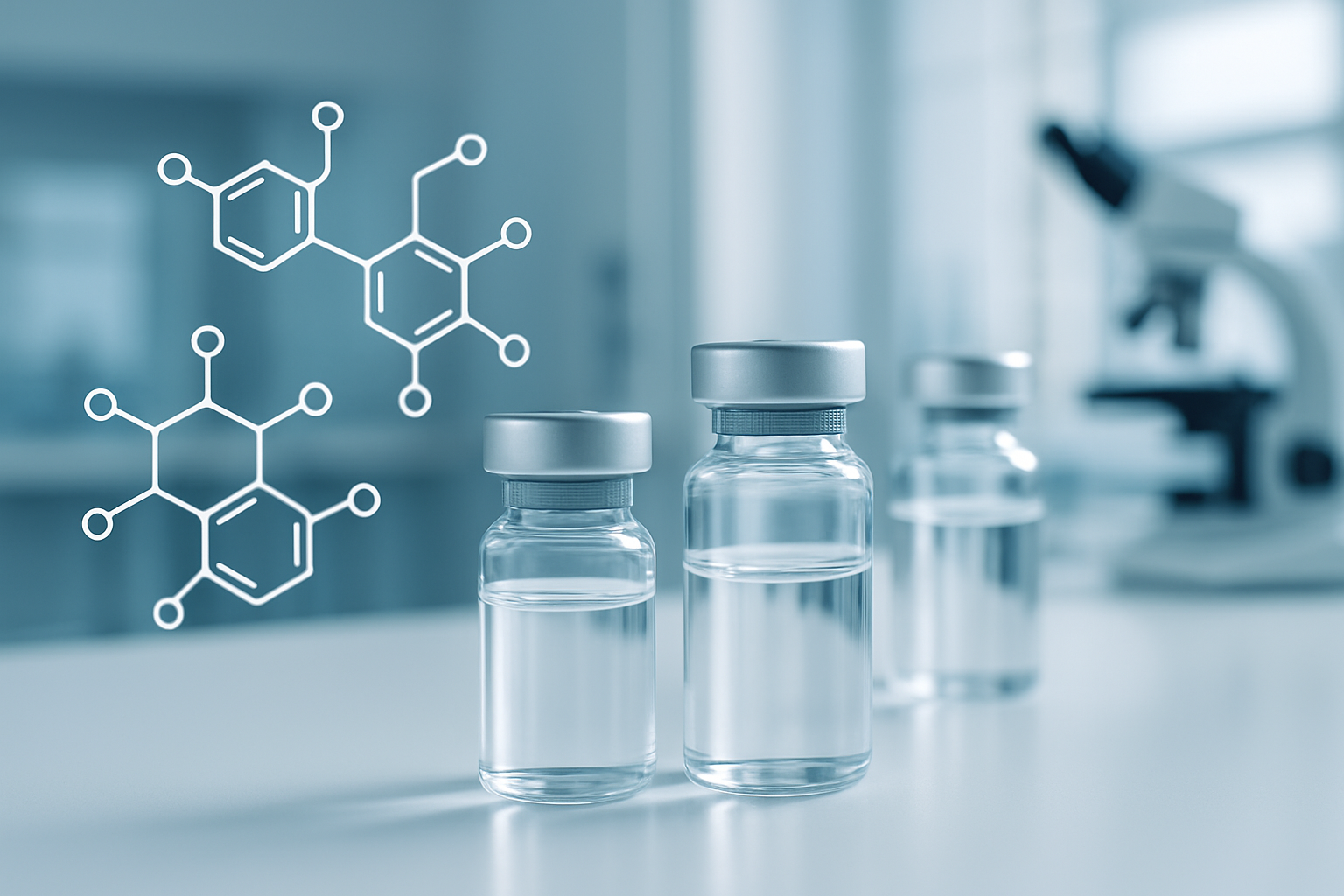RFK Jr.'s Peptide War: Influencers, "Mockingbird Media" and the FDA | Project Biohacking
How Kennedy's crusade against FDA restrictions ignited the most controversial health policy battle of our time—and why the establishment is fighting back hard

Robert F. Kennedy Jr. has ignited one of the most contentious debates in modern health policy. His pledge to end the FDA's "war" on peptides has divided the wellness community, regulatory experts, and mainstream media outlets. At the center of this controversy sits a simple question: Should Americans have broader access to peptide therapies that haven't completed traditional approval pathways?
Kennedy's stance has amplified what was already a growing trend. Wellness influencers, biohacking enthusiasts, and longevity-focused practitioners have been promoting peptide injections for years. Now, with Kennedy's political
platform lending legitimacy to these compounds, the peptide market has exploded into mainstream consciousness.
The battle lines are clear. On one side stand Kennedy, supplement manufacturers, and alternative health advocates pushing for deregulation. On the other, FDA officials, academic researchers, and major news outlets warn about safety risks and insufficient clinical evidence. Between them sits a public increasingly willing to experiment with compounds that promise enhanced performance, faster recovery, and extended healthspan.
Understanding RFK Jr.'s Position on Peptides
Kennedy frames peptides as suppressed innovations being held back by pharmaceutical interests and bureaucratic inertia. He argues these short chains of amino acids offer therapeutic potential that traditional medicine has ignored or actively opposed. His vision centers on patient autonomy—the idea that informed adults should be able to access these compounds without navigating years of clinical trials and regulatory review.
His criticism targets what he perceives as the FDA's inconsistent enforcement. While some peptides receive approval for specific medical uses, others remain in regulatory limbo despite widespread use in wellness circles. Kennedy contends this creates a two-tier system where pharmaceutical companies can profit from peptide-based drugs while practitioners and patients face restrictions on compounding or off-label applications.
The political calculation is straightforward. Kennedy has built substantial support among Americans skeptical of regulatory agencies, pharmaceutical corporations, and conventional medical establishment. Peptides represent a tangible example of what he frames as innovation being stifled by captured regulators. By championing access to these compounds, he positions himself as an advocate for medical freedom and consumer choice.
His messaging resonates particularly strongly with the biohacking community. These self-experimenters view peptides as tools for optimization rather than treatments for disease. They're less concerned with FDA approval than with anecdotal reports, N=1 experiments, and theoretical mechanisms of action. Kennedy's support validates their approach and provides political cover for continued experimentation.
How RFK Jr. Has Influenced FDA Peptide Policy
Kennedy's impact on FDA policy predates any formal governmental role. His public advocacy has pressured the agency to reconsider several compounding bans and restrictions. The FDA has held advisory meetings specifically addressing peptides that were previously on banned substance lists, a move widely attributed to political pressure from Kennedy and allied industry groups.
Reports indicate changes to FDA advisory panels, with some experts removed from positions related to compounding oversight. These shifts have raised concerns among critics who worry that more peptide-friendly specialists will shape future policy decisions. The supplement and peptide industries have openly celebrated Kennedy's influence, anticipating broader leeway for marketing claims and manufacturing practices.
The practical effects are already visible. Compounding pharmacies have grown more aggressive in their peptide offerings, betting that enforcement will soften under Kennedy's continued pressure. Online vendors have expanded their catalogs, often adding disclaimer language about "research use only" while clearly marketing to consumers. Some clinics now prominently feature peptide protocols, framing them as cutting-edge therapies rather than experimental compounds.
Kennedy's most significant impact may be rhetorical rather than regulatory. By consistently characterizing FDA oversight as a "war" on innovation, he's shifted public perception. Peptides have moved from fringe biohacking territory into mainstream conversation. This normalization creates political momentum that makes stricter enforcement increasingly difficult, regardless of formal policy changes.
The Rise of Unproven Peptides Through Influencers
Wellness influencers have become the primary distribution channel for peptide information and enthusiasm. Podcasters, Instagram personalities, and YouTube creators regularly discuss their experiences with various peptides, often attributing dramatic benefits to these compounds. Joe Rogan's podcast has featured multiple guests discussing peptide protocols. Gary Brecka and similar wellness celebrities have built substantial followings partly through their advocacy of peptide therapies.
These influencers operate in a unique space. They're not making formal medical claims that would trigger FDA enforcement, but their personal testimonials and enthusiastic recommendations drive substantial consumer interest. The business model is straightforward: build an audience around health optimization, introduce peptides as advanced tools, then monetize through affiliate partnerships, coaching programs, or branded products.
The peptide trend reflects broader shifts in how health information circulates. Traditional gatekeepers—medical journals, regulatory agencies, licensed practitioners—no longer control the conversation. Influencers with large platforms can introduce compounds to millions of people before clinical validation exists. Their audiences often trust peer recommendations and personal experience over institutional expertise.
Social proof amplifies the trend. When followers see multiple trusted sources discussing peptides, trying them becomes normalized. Comment sections fill with anecdotal success stories. Private communities form around specific peptides or protocols. This creates self-reinforcing enthusiasm that can overwhelm cautionary messaging from medical authorities.
The economic incentives align perfectly. Peptide vendors offer generous affiliate commissions. Influencers can position themselves as guides to this emerging space, selling courses or coaching on peptide selection and dosing. The gray-market nature of many peptides actually enhances their appeal to audiences seeking alternatives to conventional medicine.
The Reality Behind Peptide Safety and Clinical Evidence
Peptides have been quietly circulating in wellness and research communities for more than forty years. That's four decades of real-world human experience happening outside the formal clinical trial system. The mainstream conversation treats this history as if it doesn't exist, but anyone paying attention knows that millions of doses have been administered with remarkably few serious problems reported.
Critics hammer on the absence of large-scale trials. What they don't mention is why those trials don't exist in the first place. Peptides are naturally occurring amino acid sequences. You can't patent them. A pharmaceutical company that spends $500 million proving a peptide works safely would watch competitors immediately produce generic versions the day after approval. No patent protection means no return on investment. The system isn't set up to validate compounds that can't generate monopoly profits, regardless of their therapeutic potential.
Here's something worth considering: peptides are made from amino acids, the exact same molecules your body already manufactures and uses every single day. When you inject BPC-157 or thymosin alpha-1, you're introducing compounds your cells already recognize and know how to process. Compare that to synthetic drugs with completely novel chemical structures—molecules that never existed in nature until a lab created them. The body handles familiar building blocks differently than it handles foreign substances.
The safety record backs this up. Serious adverse events in peptide communities are exceptionally rare despite widespread use. When problems do surface, they usually trace back to contaminated products from sketchy vendors, user error with dosing, or pre-existing conditions that would complicate any intervention. The peptides themselves aren't causing widespread damage. If they were inherently dangerous, forty years would have given us mountains of casualties. Instead, we've got growing adoption and mostly positive experiences.
Quality sourcing matters, obviously. But framing this as an unsolvable problem ignores what's actually happening in the market. Reputable compounding pharmacies run the same purity tests as pharmaceutical manufacturers. Certificates of analysis are standard practice among serious vendors. Third-party testing is available. Users who do their homework can access pharmaceutical-grade peptides without waiting for FDA approval that may never come due to economic constraints.
The medical supervision argument assumes doctors know more about peptides than experienced users. That's often backwards. Most physicians never encounter peptides in practice and have no training on protocols. Meanwhile, dedicated communities have been refining dosing strategies, tracking responses, and sharing outcomes for years. This collective knowledge base rivals what you'd find in many clinical settings. Dismissing all self-directed use as reckless ignores how expertise actually develops.
Look at the evidence question from both angles. Yes, we don't have massive randomized controlled trials for most wellness peptides. We also don't have evidence of widespread harm after four decades of use. Absence of evidence works both ways. Demanding pharmaceutical-standard proof before access means restricting compounds based on economic barriers rather than actual safety concerns. That's a policy choice, not a scientific necessity.
Mainstream Media vs. Alternative Health Narratives
Major news outlets have launched a sustained campaign highlighting peptide risks. CNN, ABC, Associated Press, and others have published investigative pieces framing the peptide trend as a public health concern. These articles typically emphasize the lack of FDA approval, quote academic researchers warning about safety issues, and portray influencer-driven peptide use as reckless experimentation.
Alternative health advocates dismiss this coverage as "Mockingbird media"—coordinated messaging designed to protect pharmaceutical interests and regulatory authority. They argue that mainstream outlets consistently frame wellness alternatives negatively while accepting pharmaceutical marketing uncritically. The term references conspiracy theories about intelligence agency influence over media, suggesting coordinated propaganda rather than independent journalism.
This framing resonates with audiences already skeptical of mainstream institutions. When CNN warns about peptide risks, Kennedy supporters see confirmation of media bias rather than legitimate safety concerns. The more aggressive the mainstream coverage becomes, the more it reinforces alternative narratives about suppressed innovation and captured regulators.
The clash reflects fundamentally different epistemological frameworks. Mainstream medical journalism relies on peer review, regulatory approval, and institutional expertise as markers of credibility. Alternative health spaces prioritize personal experience, mechanistic plausibility, and skepticism toward industry-funded research. These worldviews talk past each other rather than engaging substantively.
Social media amplifies this polarization. Users self-select into communities that reinforce their existing perspectives. Peptide enthusiasts share success stories and dismiss mainstream warnings as propaganda. Critics share cautionary tales and characterize peptide users as victims of influencer manipulation. Both sides accumulate evidence supporting their positions while remaining convinced the other is dangerously misguided.
The Peptide Industry's Economic Interests
Supplement manufacturers and peptide vendors view Kennedy's advocacy as a business opportunity. Current regulations create friction for peptide marketing and sales. Companies must navigate compounding restrictions, avoid making therapeutic claims, and operate in legal gray areas. Kennedy's promised regulatory reforms could eliminate these constraints, opening peptide sales to mass market distribution.
The economic stakes are substantial. The wellness industry has grown increasingly sophisticated at monetizing health optimization trends. Peptides represent premium products commanding high prices and strong margins. If regulatory barriers fall, established supplement companies could rapidly enter the peptide market with distribution networks and marketing budgets that dwarf current vendors.
Compounding pharmacies stand to benefit significantly from relaxed oversight. They've already expanded peptide offerings in anticipation of policy changes. If FDA restrictions ease further, these pharmacies could position themselves as legitimate peptide sources without pharmaceutical-grade manufacturing requirements. This would legitimize their business model while maintaining favorable economics.
Online vendors operate in the most precarious position legally but stand to gain the most from deregulation. Many currently label peptides as "research chemicals" or "not for human consumption" to avoid regulatory enforcement. Kennedy's reforms could allow them to market directly for human use, dramatically expanding their addressable market while reducing legal risk.
Critics argue these economic interests shape Kennedy's policy positions as much as pharmaceutical interests allegedly shape FDA policy. The supplement industry has donated substantially to Kennedy's political efforts and stands to profit enormously from his proposed reforms. This creates potential conflicts of interest that mirror the pharmaceutical influence Kennedy critiques.
Patient Autonomy vs. Public Health Safeguards
The peptide debate ultimately centers on competing values. Kennedy and his supporters emphasize individual freedom—the right to make informed choices about one's own body, even when those choices involve uncertain risks. They view FDA restrictions as paternalistic overreach that infantilizes adults and protects corporate interests rather than public health.
This perspective has philosophical appeal. Adults routinely make consequential health decisions without regulatory approval. They choose diets, exercise routines, and supplements based on personal research and preferences. Peptides, advocates argue, simply extend this principle to a new category of compounds. Informed consent should be sufficient; government approval shouldn't be required.
Public health officials counter that individual autonomy must be balanced against demonstrated safety. Peptides aren't simply supplements or lifestyle choices—they're biologically active compounds that can cause serious harm if improperly used. The FDA approval process exists precisely to identify risks that aren't apparent to individual users. Without this oversight, vulnerable consumers face exploitation by unscrupulous vendors.
The information asymmetry is substantial. Most peptide users lack the training to evaluate clinical evidence, assess compound purity, or recognize adverse effects. They rely on influencer testimonials and marketing claims rather than rigorous analysis. This makes truly informed consent difficult, even when users believe they've done thorough research.
There's also a collective action problem. Individual experimentation with peptides generates no systematic safety data. Adverse effects go unreported or misattributed. Long-term risks remain unknown because no entity is tracking outcomes. The FDA approval process, despite its flaws, creates standardized data collection that benefits all users. Pure autonomy eliminates this public good.
Biohacking Culture and the Longevity Movement
Peptides have become central to modern biohacking practice. The community's ethos celebrates self-experimentation, data-driven optimization, and willingness to try cutting-edge interventions before clinical validation. Peptides fit perfectly—they're sophisticated enough to signal insider knowledge while accessible enough for determined amateurs to source and use.
The longevity movement has particularly embraced peptides. Compounds like BPC-157, Thymosin Alpha-1, and Epithalon are discussed as potential tools for extending healthspan and lifespan. While clinical evidence remains limited, the theoretical mechanisms—enhanced healing, immune modulation, cellular repair—align with longevity biology principles. This makes peptides attractive to those optimizing for long-term health rather than immediate disease treatment.
N=1 experimentation is celebrated within these communities. Users meticulously track biomarkers, subjective experiences, and performance metrics while cycling through various peptides. They share protocols, source recommendations, and outcome data through private forums and messaging groups. This creates crowdsourced knowledge bases that exist entirely outside formal medical channels.
The regulatory lag is viewed as inevitable rather than problematic. Biohackers accept that cutting-edge interventions will always outpace official approval. They argue that by the time clinical trials conclude, better compounds will have emerged. Waiting for regulatory certainty means forgoing potential benefits. Risk tolerance becomes a feature rather than a bug—those comfortable with uncertainty gain access to innovations first.
Critics worry this culture normalizes reckless experimentation. The selective sharing of positive results while downplaying negative experiences creates survivorship bias. The lack of medical supervision means adverse effects may be mismanaged. The emphasis on optimization can shade into obsession, particularly when expensive compounds promise marginal gains that may not materialize.
Regulatory Capture and the Innovation Debate
Kennedy's "regulatory capture" argument has significant traction. The FDA's funding and personnel often involve pharmaceutical industry connections. Former FDA officials regularly join drug companies. Industry-funded research dominates regulatory submissions. These relationships create at minimum the appearance of conflicts of interest, at maximum actual bias toward protecting incumbent interests.
The innovation question is more complex. FDA approval processes are undeniably slow and expensive. This creates barriers to entry that favor large pharmaceutical companies with resources to navigate multi-year trials costing hundreds of millions of dollars. Smaller companies and novel compounds struggle to compete. The result may be less innovation and higher prices than alternative regulatory frameworks would produce.
However, critics of Kennedy's position note that regulatory capture can run both directions. Relaxing oversight doesn't eliminate industry influence—it simply shifts which industries gain advantage. Supplement manufacturers and peptide vendors have their own profit motives and may be less scrupulous than pharmaceutical companies operating under stricter standards. Deregulation could enable a different form of corporate exploitation rather than empowering consumers.
The "war on innovation" framing is also contested. FDA approval exists because unrestricted markets in medical products have historically produced disasters. Thalidomide, elixir sulfanilamide, and numerous other tragedies preceded current regulations. While approval processes can be improved, eliminating safeguards entirely risks repeating past mistakes. Innovation is valuable, but not all innovation proves safe or beneficial.
There's a middle ground that both sides rarely acknowledge. Regulatory reform could streamline approval for lower-risk compounds while maintaining safety standards. Adaptive pathways, conditional approval, and post-market surveillance might balance access and caution better than current frameworks. But this nuanced approach gets lost in polarized debates framing the issue as complete deregulation versus status quo.
What's Next for Peptide Policy
Kennedy's continued advocacy ensures peptides will remain politically contentious. His supporters view relaxed regulation as core to his health policy vision. His critics see it as dangerous deregulation that exposes consumers to unproven therapies. This tension will likely intensify as more Americans experiment with peptides and outcomes—both positive and negative—accumulate.
The FDA faces mounting pressure from multiple directions. Industry groups are demanding clearer pathways for peptide approval and compounding. Kennedy's political influence pushes toward deregulation. Simultaneously, medical organizations and consumer safety advocates call for stricter enforcement and better tracking of adverse events. The agency must navigate these competing demands while managing limited resources.
Legal challenges will likely proliferate. Compounding pharmacies, clinics, and vendors facing enforcement may challenge FDA authority more aggressively, betting that Kennedy's influence will lead to favorable rulings. Conversely, consumer protection groups may sue to force stricter oversight if the FDA appears to be softening standards under political pressure.
The influence of mainstream media coverage is uncertain. Exposés highlighting peptide risks may convince some consumers to avoid these compounds. Others may view the coverage as confirmation of establishment bias, reinforcing their determination to access peptides despite official warnings. The polarization of information sources means identical facts will be interpreted completely differently across different audiences.
Ultimately, the peptide landscape will be shaped by outcomes. If widespread use produces clear benefits without serious safety issues, Kennedy's position will be vindicated and pressure for access will intensify. If significant adverse events emerge—particularly if they affect high-profile users or create public health crises—the regulatory pendulum will swing back toward restriction. The data we're generating through current experimentation will determine which path we follow.
Navigate the Peptide Revolution with Expert Guidance
The peptide conversation is evolving rapidly, with new developments in policy, research, and accessibility happening constantly. Whether you're exploring peptides for the first time or optimizing existing protocols, having accurate, evidence-based information makes all the difference.
At Project Biohacking, we cut through the noise and provide comprehensive peptide education grounded in real-world experience and scientific understanding. From detailed compound profiles and dosing protocols to sourcing guidance and regulatory updates, we help serious health optimizers make informed decisions about peptide therapy.
Ready to go deeper? Explore our complete peptide resources, guides, and expert insights at projectbiohacking.com.
FAQ: RFK Jr. and the Peptide Controversy
Why is RFK Jr. promoting peptides?
Kennedy views peptides as promising alternative therapies being unfairly restricted by FDA policy he characterizes as influenced by pharmaceutical interests. He's built political support among Americans skeptical of regulatory agencies and conventional medicine by positioning himself as an advocate for healthcare alternatives and patient choice. His pledge to end the FDA's "war" on peptides appeals to wellness communities and the supplement industry, both of which hope for relaxed oversight that would enable broader marketing and access.
What are "unproven peptides" and why are they controversial?
Unproven peptides are short chains of amino acids marketed for wellness applications—anti-aging, muscle gain, recovery, longevity—without having completed FDA approval processes through large-scale clinical trials. They're controversial because while some show promise in preliminary research or animal studies, most lack human safety and efficacy data from controlled trials. Users are essentially conducting unmonitored experiments on themselves with compounds of uncertain purity from sources operating in regulatory gray areas.
How has mainstream media responded to the peptide trend?
Major outlets including CNN, ABC, and Associated Press have published investigations warning about peptide risks, emphasizing lack of FDA approval and quoting researchers about safety concerns. Critics in alternative health spaces dismiss this coverage as "Mockingbird media"—coordinated messaging designed to protect pharmaceutical interests and regulatory authority rather than legitimate journalism. This has created polarized information ecosystems where identical facts are interpreted as either responsible reporting or corporate propaganda depending on audience perspective.
What are the actual safety concerns with peptides?
The primary concerns include lack of clinical validation for most wellness peptides, potential purity and contamination issues with compounds from unregulated sources, absence of medical supervision for dosing and monitoring, unknown long-term effects, and possible interactions with medications or underlying conditions. Without pharmaceutical-grade manufacturing and systematic adverse event tracking, users face uncertain risks that may not become apparent until serious harm occurs.
Who benefits economically from relaxed peptide regulations?
Supplement manufacturers, compounding pharmacies, online peptide vendors, wellness clinics, and influencers with affiliate partnerships all stand to profit substantially from deregulation. Current restrictions create legal and marketing friction that limits peptide sales. Kennedy's proposed reforms would open this market to mass distribution with fewer constraints. Critics note these economic interests may influence policy positions as much as the pharmaceutical influence Kennedy criticizes.
What's the difference between FDA-approved peptides and wellness peptides?
FDA-approved peptides have undergone rigorous clinical trials demonstrating safety and efficacy for specific medical conditions. They're manufactured to pharmaceutical standards with verified purity and potency. Wellness peptides marketed through alternative channels typically lack this validation—they may be the same chemical compounds but without controlled studies proving they work as claimed or are safe for widespread use. The regulatory status reflects evidence level, not necessarily the compound's inherent properties.
Can patients legally access peptides currently?
The legal landscape is complex. Some peptides are available through compounding pharmacies with prescriptions, though FDA has restricted certain compounds it considers high-risk. Online vendors sell peptides labeled "for research use only" or as "research chemicals," creating plausible deniability while clearly marketing to consumers. Possession and personal use occupy gray areas, while clinics administering peptides may face enforcement if FDA determines they're providing unapproved drugs. Legality varies by specific compound, state, and how it's obtained.
What would happen if RFK Jr.'s peptide reforms are implemented?
Likely outcomes include expanded compounding pharmacy peptide offerings without pharmaceutical-grade requirements, more aggressive consumer marketing by supplement companies entering the peptide space, reduced enforcement against clinics providing peptide therapies, and mainstreaming of compounds currently operating in gray markets. Whether this produces innovation and consumer benefit or safety disasters and exploitation depends on implementation details and which safeguards remain in place.










